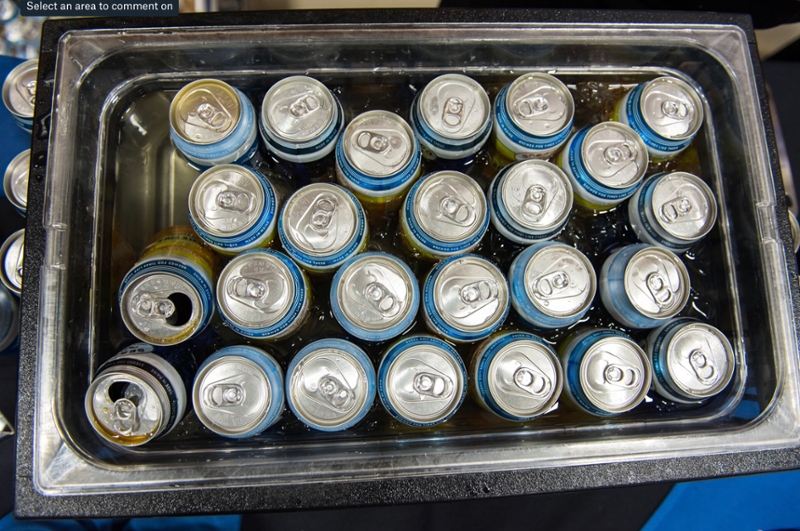Sean Sullivan ’08 Helps Mobilize Maine Brewers to Address Hand Sanitizer Need
By Tom PorterMaine breweries are donating beer as part of a statewide effort to address the shortage of hand sanitizer, a much-needed commodity in the ongoing war against the novel coronavirus. Helping to mobilize the beer producers is Sean Sullivan ’08, executive director of the Maine Brewers’ Guild.

Sean Sullivan ’08 speaking at Bowdoin College, 2016
“We were contacted in late March by a supply chain specialist from Maine hospitals who alerted us to the need. From there, we connected with Ned Wight of New England Distilling in Portland, who helped explain the process and organize the distillers,” said Sullivan.
“Exactly how is beer used in the production of hand sanitizer?” you may ask. Hand sanitizer is either made from isopropyl alcohol or ethanol, which is just another name for alcohol, explained Sullivan, who majored in art history at Bowdoin. “Brewers are always producing ethanol when they brew beer. Beer brewing equipment, however, is not set up to produce the concentrated ethanol needed for sanitizer, which is over 90 percent alcohol,” he said, “so that’s where the distillers come in. Maine brewers are taking the beer they have, which contains 4 to 12 percent alcohol, and passing it on to the distilleries, who use it as the raw ingredient to distill it into the stronger alcohol required to produce hand sanitizer.”
Typically, the beer will first go to a rum or whisky distillery, where it will be distilled into alcohol that’s between 40 and 60 percent in strength. “From here, the product goes to a vodka or gin distiller, where they have differently designed stills that can distill the solution to 96 percent alcohol, which is the recommended minimum concentration for hand sanitizer made with ethanol. From the distilleries, the product is handed over to chemical engineers at the University of Maine, who formulate the sanitizer and share it with Maine hospitals.”
By starting the process with ready-made beer, rather than with the raw materials, explained Sullivan, Maine brewers are accelerating the production supply chain. “The best analogy that I've come up with to explain how beer is involved is to imagine you’re in your kitchen and want to make chicken noodle soup. You could start out with water and chicken bones, but if you have some pre-made chicken stock, you will be able to make the soup faster. In this analogy, distillers are starting with beer (already concentrated alcohol, albeit at low percentages) as opposed to water and malted grains, and thus are able to more rapidly distill out the alcohol needed.”

Extra supplies of beer, left over after the cancelation of St Patrick's Day festivities, were put to good use. Photo: Maine Brewers' Guild.
Maine breweries responded enthusiastically, said Sullivan, and there are currently nearly twenty of them involved in the effort. “Some brewed special batches to donate, while many, due to the cancellation of St. Patrick’s Day festivities last month, had a lot of unused inventory they were happy to donate as well.” Industry regulators also played a part in speeding up the process, he explained, with the federal authorities temporarily waiving licensing requirements for production of ethanol and the World Health Organization publishing clear guidelines for sanitizer production.
“Maine brewers have been able to meet the demands of the distillers so far, with expectations they will continue to be able to do so,” said Sullivan. The bottleneck in the supply chain right now, he added, is really around the distilling capacity. “There is plenty more beer to be donated, and distillers are working nonstop to do what they can. Overall, I'm grateful that Maine’s thriving brewing industry has this opportunity to support efforts to fight the COVID-19 pandemic for the common good.”
Read/ listen to Maine public radio’s coverage of this story.



